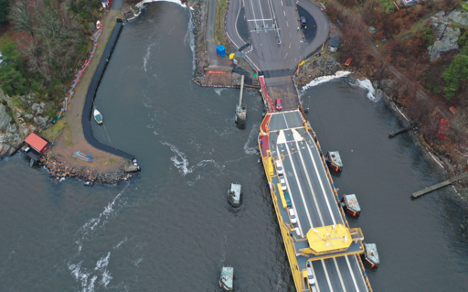The Swedish Transport Administration (Trafikverket) has commissioned METS Technology to construct and install a charging station for road ferries operating between Skår and Finnsbo on Gullmarsleden, near the city of Lysekil in Sweden.
Trafikverket says that this charging station will revolutionize the charging process for ferries, contributing to the organization’s goal of achieving a fossil-free transportation sector by 2045. The fully automated charging station eliminates the need for manual mooring and connection, streamlining the process for the ferry crew. Upon connection, the ferry can charge at up to 3MW, equivalent to the capacity of 12 fast chargers for cars. What sets this charging station apart is its integration of an automated mooring function, significantly reducing energy consumption.
The project will encompass extensive construction and civil engineering, including the construction of buildings for onshore charging equipment, piling, construction of platforms in the water, and the adaptation of existing ferries to enable connection to the powerful 3MW charging.
METS Technology assumes overall responsibility for project integration and coordination, delivering onshore electrical systems and onboard ferry equipment. The following companies have been engaged as subcontractors for different project components: ONEARC from Gothenburg in Sweden will provide a complete system for automatic mooring, as well as construction of platforms, footbridges and other necessary facilities for gangways; Zinus from Norway will supply a charging cable management system that automatically positions itself according to the ferry’s location, engaging the charging connector in a fully automated process; and Kyros from Gothenburg, in collaboration with MVB Väst and GBG Mark, will manage all the onshore construction and civil engineering work.
The construction of this charging station forms part of Trafikverket’s vision of a fossil-free transportation infrastructure by 2045. VF Tellus, one of the ferries on the route, has already been converted to electric propulsion and is currently operating as a plug-in hybrid. Following the installation of the charging station, the ferry will sail fully electric and emission-free.
Read more of the latest battery technology updates from the electric and hybrid marine technology industry, here.



